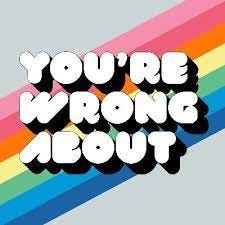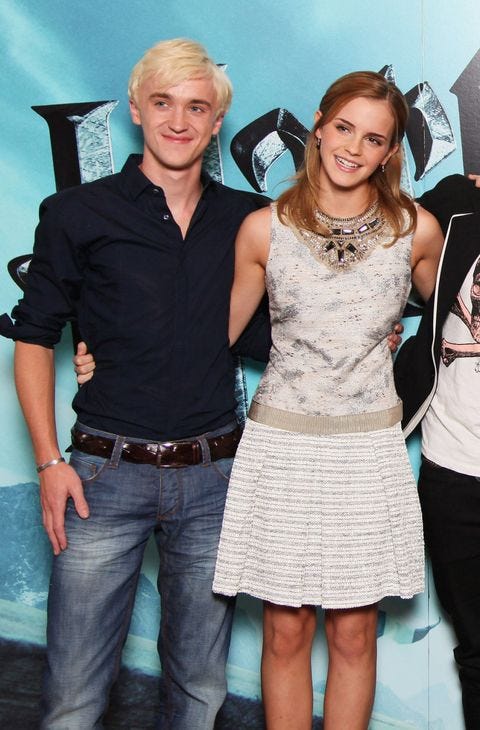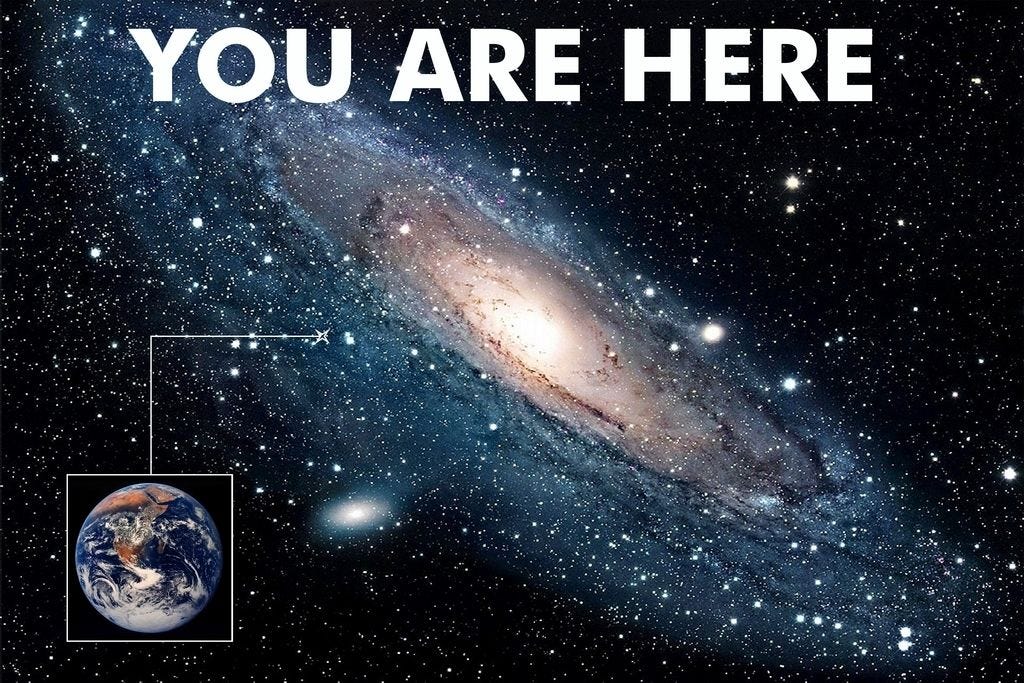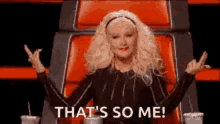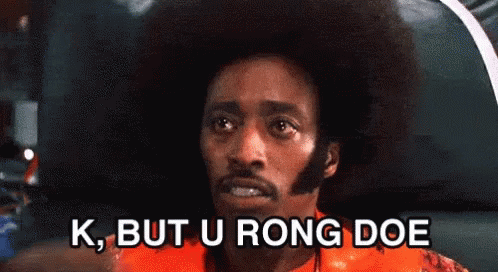It's Not You...It's Your Mindset?
Talking About Rejection
Hi all from San Francisco (!)
It feels like it’s been so long since I’ve actually been situated in my home city, and it’s been very nice seeing friends, colleagues and of course… flip-flopping between freezing and sweating every hour, because that is SF summer weather in a nutshell.

PS, I wrote about another widely misunderstood quote from “The Path Not Taken” in my post on atypical paths a few weeks ago. I’m always fascinated by how historical literature and concepts get misinterpreted and take on a life of their own on the interwebs, like a game of telephone.
PPS, On that topic, check out this great podcast:
“Mike and Sarah are journalists obsessed with the past. Every week they reconsider an event, person or phenomenon that’s been miscast in the public imagination.”
PPPS I love thinking about what people’s personal podcast titles would be based on the things they like to talk about, and their general shorthand. It’s somewhat reductive, but fun to think about how you’d want your personal brand summed up, or how you’d sum up someone else in one pithy sentence or quip.
My close friend has a million ideas a minute, and is a self-proclaimed optimizer: “How I’d Do It Better”
My partner is a self-proclaimed contrarian and likes to gather as much data as possible before taking action: “Why Should I Do That?”
What are some of yours and why?
This week on the newsletter, we’re going to talk about rejection in a career context.
It doesn’t matter how successful, well-adjusted or generally happy you are, rejection sucks, and it’s completely universal.
Even celebrities deal with rejection.
Maybe you’re thinking to yourself, “Relating to Drake isn’t really that uplifting for me.”
I present to you, Emma Watson:
Yup. Hermione Granger had a big ol’ crush on Draco Malfoy and he shut. her. down.
"He was a few years older and he had a skateboard — and that just did it really."
Apparently, Tom [Felton] "totally" knew about her crush and totally dissed her. "The thing is that he'd tell everyone, 'I see her in a younger, sisterly way,'" Emma dished. "It just broke my heart. It still does."
Confirmed: Everybody gets rejected. No matter how brilliant, charming or intelligent they are.
If you’ve recently experienced a setback or rejection in your job situation (for a role, for a job, for a promotion), and it feels like its more than just merely disappointing, like it’s a deeper feeling, it’s not you being overly dramatic.
fMRI studies show that an experience of rejection and an experience of physical pain can both activate the same areas of the brain.1 Certain parts of our brain light up in response to both stimulus. There’s actually an evolutionary reason behind it all too - back in the early days of human evolution, being ostracized by our ‘tribe’ meant our survivalhood was at stake. Evolutionary psychologists assume that we developed this warning system in response to rejection, so that we’d adjust our behavior and minimize the risk of being exiled.
Rejection is somewhat universal and avoidable, and is scientifically proven to deeply suck, so I want to explore ways to adjust our way of relating to rejection, in an effort to reduce the sucking.
I posted this quote on my Instagram over the weekend:

I get an uncomfortable feeling in the pit of my stomach when I read the first part of the quote, when I think about all the times I’ve been rejected. I’ve been rejected in job positions, job progression, job promotions… and more broadly, in my personal life (I was a single lady for a number of years in NYC, which is an endless series of highs and lows and rejections). Rejection teaches you where you stand, and it’s not where (you thought) you wanted to be. UGH.
But then I started re-reading that quote, and over time, I started to read it as simply a statement, without attaching emotion to it.
Rejection teaches you about where you stand. Merely statement of a position.
Rejection feels so painful, because we internalize it to mean something about who we are, our intrinsic identities and value. When we receive feedback that our position is different from where we want or expect, we feel like our identity and worth is different (or reduced).
But rejection is merely a position:
It’s a position. ➡️ It’s not *who* you are.
It’s a position in time. ➡️ It’s not permanent.
It’s information. ➡️ It’s not your worth
In a work context, maybe rejection tells you you’re slightly left or right of what the job needs. Maybe it tells you you’re a few years behind (or ahead!) of what the job needs.
Left. Right. Behind. In front. They’re all just positions that tell us where we are, and help us calibrate and orient accordingly.
Some shifts to the rejection mindset I want to explore with you:
In Musings below, I talk about the concept of making rejection your goal. It’s not something that feels scary and unknown, and devastating. It’s something preplanned for.
In this week’s Conversation, I talk with someone who was recently passed over for their “dream job”. We unpack the mythology of the “dream job”, and how our initial approach to the end goal can be helpful in alleviating the disappointment of rejection.
Musings
I wanted to write a newsletter or explore career coaching for years before I ever put pen to paper. I put it off for so long, because I hated the idea of being rejected, or getting bad feedback - especially for something that seems so personal and tied to my personality and thoughts.
Now, actually writing this newsletter has been an exercise in vulnerability for me. I put out content weekly, send it out into the ether, and hope that it resonates with people, and that maybe the readership grows over time. Maybe one day even later in the future, I can convert it to a paid newsletter, or as a marketing vehicle for coaching clients. These are big, lofty goals - and what I’ve learned in starting this newsletter is that the ‘funnel’ for these goals looks pretty daunting.
If I post something on LinkedIn, it’ll get ~2,000 looks, maybe 10-15 likes, and 1-2 click throughs and subscriptions
Once someone has subscribed, not everyone will open every newsletter. In fact, a good open rate is <50%
From those that open the newsletter, converting readers to paid readers is 5-10%
If I want to make the leap to offering coaching services, the ‘success rate’ from the top of the funnel is… probably anemic.
The worrywart in me says, “That is pretty dire. The online content space is saturated. Why even get started?”
The productivity fiend in me says, “If I want to hit a goal of a handful of paid readers next year, I gotta go find hundreds of people who say no.” And so I do that weekly, by continuously publishing, iterating and getting feedback on what people find valuable.
There are weeks that go by with no new subscribers, but there aren’t many weeks that go by without feedback - even if it’s not growing, I’m learning about my process and my readers.
Flipping the rejection mindset on its head takes the fear of failure away. You know you’re going to be rejected some of the time, the first few rejections take away the sting of future rejections (not always true, but directionally), and checking the rejections off systematically helps remove some of the negative emotion around it.
Conversations
One of my conversations this week was with a good friend who had recently applied for a job that seemingly had all of the traits she was looking for. The role had a combination of technical requirements, and relationship building/soft skills, and prior to applying, we chatted a lot about how it was the ‘perfect role’ for her, because she possessed that combination of skills that was somewhat unique in her field.
I think setting jobs up in this way (the ‘perfect role’, that in turn validates some skillset of ours), can oftentimes set us up for disappointment down the road, and magnifies the sting of rejection.
When we are interviewing or applying, we know so little about a job, but we selectively choose the most appealing traits to hone in on… then we make them mean something about us.
“This job needs someone who is a self-starter, who is deeply analytical…”
And if we don’t get the role (for any myriad of reasons that have nothing to do with us), we implicitly extrapolate:
If A=A (the person that gets this job is a self-starter and analytical) , then not A=not A (I’m not the person that gets this job, therefore I am not a self-starter and I am not analytical).
We’re setting it up in our minds wrong.
There is a whole analogy here with dating too… you meet someone on a first date, and hone in on their positive traits. Then we interpret their interest in us as indirectly validating traits we want validated. If their interest wanes, we interpret it as an invalidation of those traits….
Certain jobs might have some interesting traits that (on its surface) might be a fit, but putting something on a pedestal as the be-all, end-all role sets us up to be more disappointed than necessary if/when things don’t working out.
Resources/Links
“The Sound of My Inbox” A piece on the proliferation of newsletters/contents in our inboxes (you’re welcome!) (nymag.com)
10 Surprising Facts About Rejection (Psychology Today)
How to Handle Rejection In Your Job Search (LinkedIn)
Cool ladies doing cool things: I was listening to an interview with comedian Tiffany Haddish on a podcast, and she recently launched an internship program for participants in the foster program, with her “She Ready” foundation (Black Enterprise)
https://www.psychologytoday.com/us/blog/the-squeaky-wheel/201307/10-surprising-facts-about-rejection


